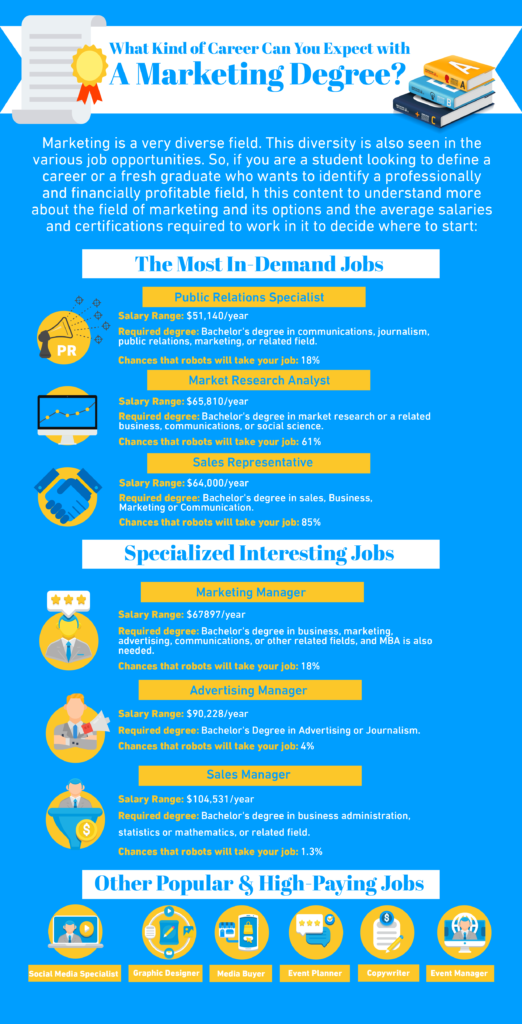Marketing Degree!There are many career opportunities that marketing graduates can find upon graduation. They can work in customer service, communications, human resources, and sales other than as marketing consultants or marketers.
The labor market is growing and becoming more and more extensive due to globalization and increased trade. So, the number of jobs increases annually, usually by 20%, which provides more job opportunities for fresh graduates.
It means that you have a higher chance of getting employed with your marketing degree.
This article was written to give you a sense of what you can do with a marketing degree, where you can work, and how you can get your first job in marketing.
Marketing Careers

Public Relationship Specialist

A degree in marketing and public relations is one of the best ways to prepare for a career in this field, but there are many others. A few different routes you could take include:
- Contribute to student newspapers/media organizations
- Work in an office as an intern or assistant
- Work with nonprofits or community organizations
Market Research Analyst

A market research analyst is not necessarily a marketer, though they may be expected to develop campaign ideas and messages.
Sales Representative

Sales representatives can be found in various industries: they might work with medical devices, fashion accessories, or even agricultural equipment. Regardless of what they're selling, they must have excellent people skills and a firm grasp of what the company they're representing offers, and this is where the importance of a marketing degree arises.
Marketing Manager

His influence is far-reaching, as it touches every aspect of the business, from the products and services to the sales and promotion to the design and delivery.
As the point person for the department, he makes sure that everyone is doing what he needs to do to grow the company and its profits. He manages budgets, schedules meetings create reports and implements new ideas. He works with outside agencies and internal departments (sales, customer service, shipping) to ensure that every facet of his business runs smoothly.
Advertising Manager

If you love staying up-to-date with new technology and trends in the media industry and are always thinking about how to push products, then an advertising manager might be your dream job.
Sales Manager

Social Media Specialist

Graphic Designer

Media Buyer

Event Planner

Event planning is a job with a lot of responsibility. It requires thinking quickly on one's feet and making decisions that affect the event's success. It also requires excellent communication skills as it can be hard to convey your ideas to others if you don't know how to communicate them effectively.
Copywriter

Copywriters use words to convince people that they should buy something. Sometimes the product is an idea (e.g., vote for this politician), sometimes it's an experience (e.g., read this novel or see this movie), and sometimes it's just a thing (e.g., check out these sneakers). All the marketing falls into one of those three categories—selling ideas, selling experiences, or the stuff of sale—and thus, most careers in marketing will involve copywriting in some capacity.
Other types of writing that are related to copywriting include:
- Business writing: includes everything from letters to memos to newsletters to annual reports
- Creative writing: includes anything from scripts for television commercials to magazine ads to website copy
- Media writing: provides press releases and media kits, which are written for journalists rather than consumers
- Corporate writing: includes corporate policies and procedures, which may be internal or public-facing
- Technical writing: includes manuals and how-to books
Event Manager

They may also be responsible for managing an office's event space or creating a plan to ensure that new hires are given enough space to accommodate their events. Still, they may also have more personal responsibilities, such as controlling one-off meetings or arranging parties for essential clients.
Controlling large budgets is a big part of what they do—it's not uncommon for their budgets to be in the thousands of dollars or tens of thousands of dollars. They're expected to find creative ways to save money while still making sure that nothing gets cut from the budget that would affect the quality of the event.
They need to stay within their budget while still making sure that everyone who works on the event feels cared for—and if there are any overages, they need to be able to justify it so that they don't end up getting fired or demoted.
What Do You Need to Excel with A Marketing Degree?

- Understand why the consumer buys.
- Be an innovative idea generator.
- Know how to hold a customer's attention.
- Influence consumer behavior with suggestive selling techniques, pricing techniques, and management of consumer perceptions.
- Use business analytics to understand consumer behavior to develop new products and services for consumers.
- Understand how to use communication tools like advertising, publicity, social media, and direct mail to reach consumers.
- Do market research to uncover trends in your industry, community, and target audience.
- Become a leader within an organization by hiring, training, and managing employees as effective managers and supervisors.
- Be able to apply data analysis, economic theory, and statistics to real business problems to make informed decisions about what will benefit your organization.
How to Find Your First Job in Marketing?

If your goal is to find a marketing internship, here are some steps to take if your goal is to find an internship in marketing, here are some steps to take:
- Research your wants and needs
- Contact companies that are likely to be a good fit for your needs
- Send them your resume and cover letter
- Follow up!
Bottomline,
Obtaining a marketing degree ensures that you will get many opportunities in almost all fields.








 2023-04-26
2023-04-26
 2023-04-04
2023-04-04
 2023-03-22
2023-03-22
 2023-03-20
2023-03-20
 2023-03-08
2023-03-08